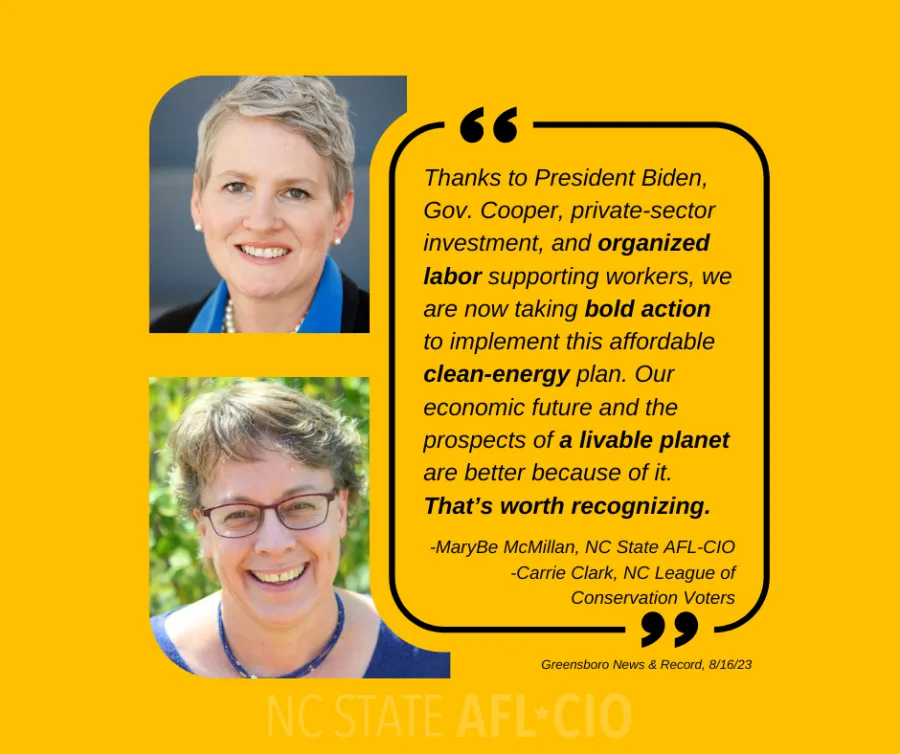Op-Ed: Inflation Reduction Act First Anniversary Worth Celebrating

This week we joined the North Carolina League of Conservation Voters (NCLCV) to recognize the first anniversary of the Inflation Reduction Act, the largest investment in clean energy in the history of the United States! Thanks to President Biden's affordable clean energy plan, North Carolina already has received $9.61 billion in investments and created 4100 jobs.
"It’s not every day that Washington works and we see tangible results in North Carolina, so when it does, we should pay attention," wrote NC State AFL-CIO President MaryBe McMillan and NCLCV Executive Director Carrie Clark in a joint opinion editorial published Tuesday in the Greensboro News & Record.
These investments build on top of a clean-energy transition that Gov. Roy Cooper has led for the past six years. Under Gov. Cooper’s leadership, with support from the IRA and the Infrastructure Investment and Jobs Act (IIJA), North Carolina is ninth in the nation for the number of clean-energy jobs — and first among all 50 states in rural clean-energy jobs, with over 25,000 clean energy jobs in rural areas.
What’s more, these jobs cannot be offshored or outsourced to other countries. We’ll need tens of thousands, if not hundreds of thousands, of new electricians and HVAC (heating, cooling and ventilation) technicians as well as manufacturing workers in EV, solar and other clean-energy industries. Working people are the backbone of this clean, electric, economic engine.
Additionally, the affordable clean-energy plan is specifically designed to bring manufacturing supply chains back to the U.S., so that our nation receives the economic benefits of creating and delivering products from start to finish. Not only does this help with job security and economic revival but it will help the U.S. achieve energy independence. Reducing our reliance on oil and gas means lessening our dependence on anti-democratic forces in rich fossil-fuel exporting countries.
For consumers, clean energy is cheaper to produce and more reliable, which means savings on your monthly electric bill and fewer forced blackouts. Tax credits and other incentives from the IRA will help bring down the cost of, or even make free, things like energy-efficient home improvements and all-electric appliances, electric vehicles, and solar panels for middle-class and working families in North Carolina.
Finally, this transition isn’t only about good jobs and lower utility bills. We have just had the hottest July in the history of the planet, and most likely the hottest month in recorded history. If we don’t transition away from fossil fuels, the implications for our future are becoming more obvious every day. Increases in the frequency and intensity of hurricanes, extreme weather, and other natural disasters like floods and wildfires are obvious and unavoidable.
Thanks to President Biden, Gov. Cooper, private-sector investment and organized labor supporting workers, we are now taking bold action to implement this affordable clean-energy plan. Our economic future and the prospects of a livable planet are better because of it. That’s worth recognizing.
You can read and share MaryBe and Carrie's full op-ed online at Greensboro.com.
Click here for a printer-friendly PDF.
